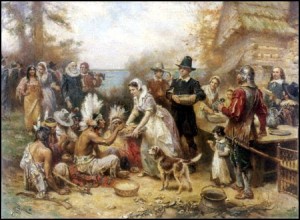 I’m feeling grumpy this morning. I read the President’s Thanksgiving Day Proclamation, and I don’t like it at all. I will tell you why I don’t like it in a minute. First, let me tell you that I always read the President’s Thanksgiving Day Proclamation and I like some better than others. Over the years some have been, well, turkeys while others have soared like an eagle. If you’re interested, you may read every single one of them here. Let me say, too, that among those turkey and eagle proclamations have been both Democrat and Republican authors.
I’m feeling grumpy this morning. I read the President’s Thanksgiving Day Proclamation, and I don’t like it at all. I will tell you why I don’t like it in a minute. First, let me tell you that I always read the President’s Thanksgiving Day Proclamation and I like some better than others. Over the years some have been, well, turkeys while others have soared like an eagle. If you’re interested, you may read every single one of them here. Let me say, too, that among those turkey and eagle proclamations have been both Democrat and Republican authors.
Pity the poor White House writer who has to compose these things.
This year’s proclamation begins with the now common but unfortunate and false revision of American history wherein that first feast at Plymouth Plantation “honored the Wampanoag for generously extending their knowledge of local game and agriculture to the Pilgrims.” Gone altogether is William Bradford’s eyewitness account that “although it be not always so plentiful, as it was at this time with us, yet by the goodness of God, we are so far from want…”
But the revision being the case, the first call in this year’s proclamation is for us to “renew our gratitude to all American Indians and Alaska Natives.” The plight of Native Americans is and has been a dark chapter in our nation’s history. Rewriting history will not make the amends that are due, however. I will need to reread Bradford’s “Of Plymouth Plantation” to get the part about the Alaska Natives. Maybe they brought salmon.
God makes the first of his two appearances in this year’s proclamation within the quotation marks of excerpts from Washington’s and Lincoln’s great Thanksgiving proclamations.
But a shift, subtle at first, but seismic in consequence has already been made. As best I can tell, the 2011 Presidential Proclamation is the first in which God, however vaguely he may be described, is displaced as the primary object of our thanks. Having offered thanks to Native Americans, we are now asked to give thanks to our men and women in uniform. Presidents Clinton and Bush often called us to honor, pray for and give thanks to God for those who serve us so bravely. This year we excise the middle man.
The proclamation ends this way: As we gather in our communities and in our homes, around the table or near the hearth, we give thanks to each other and to God for the many kindnesses and comforts that grace our lives. Let us pause to recount the simple gifts that sustain us, and resolve to pay them forward in the year to come.
God has made his second appearance and it is as the second object of our thanks, the first being each other. Oh, and then we are called to “pay it forward.”
We’ve come a long way from Abraham Lincoln’s handwritten 1863 Proclamation which ended this way: I do therefore invite my fellow-citizens in every part of the United States, and also those who are at sea and those who are sojourning in foreign lands, to set apart and observe the last Thursday of November next as a day of thanksgiving and praise to our beneficent Father who dwelleth in the heavens. And I recommend to them that while offering up the ascriptions justly due to Him for such singular deliverances and blessings they do also, with humble penitence for our national perverseness and disobedience, commend to His tender care all those who have become widows, orphans, mourners, or sufferers in the lamentable civil strife in which we are unavoidably engaged, and fervently implore the interposition of the Almighty hand to heal the wounds of the nation and to restore if, as soon as may be consistent with the divine purpose, to the full enjoyment of peace, harmony, tranquility, and union.
The grumpy part of me asks you to please give a kind “thank you” to the Wal-mart clerk you meet at the cash register at 2:00 a.m. on Black Friday. I mean, isn’t that what Thanksgiving is all about?
The Presidential Proclamation is a reminder of how frayed are the ties that bind us together as a people. It is thin gruel we share at the national table. My grumpiness does not serve us well, however. We who know the Author of all good gifts are ever called to joyful gratitude to him for who he is and what he has done.
And so, let us offer “thanksgiving and praise to our beneficent Father who dwelleth in the heavens.” And while “offering up the ascriptions justly due to Him for such singular deliverances and blessings” let us “with humble penitence for our national perverseness and disobedience” care for those who do not share fully in our bounty.
